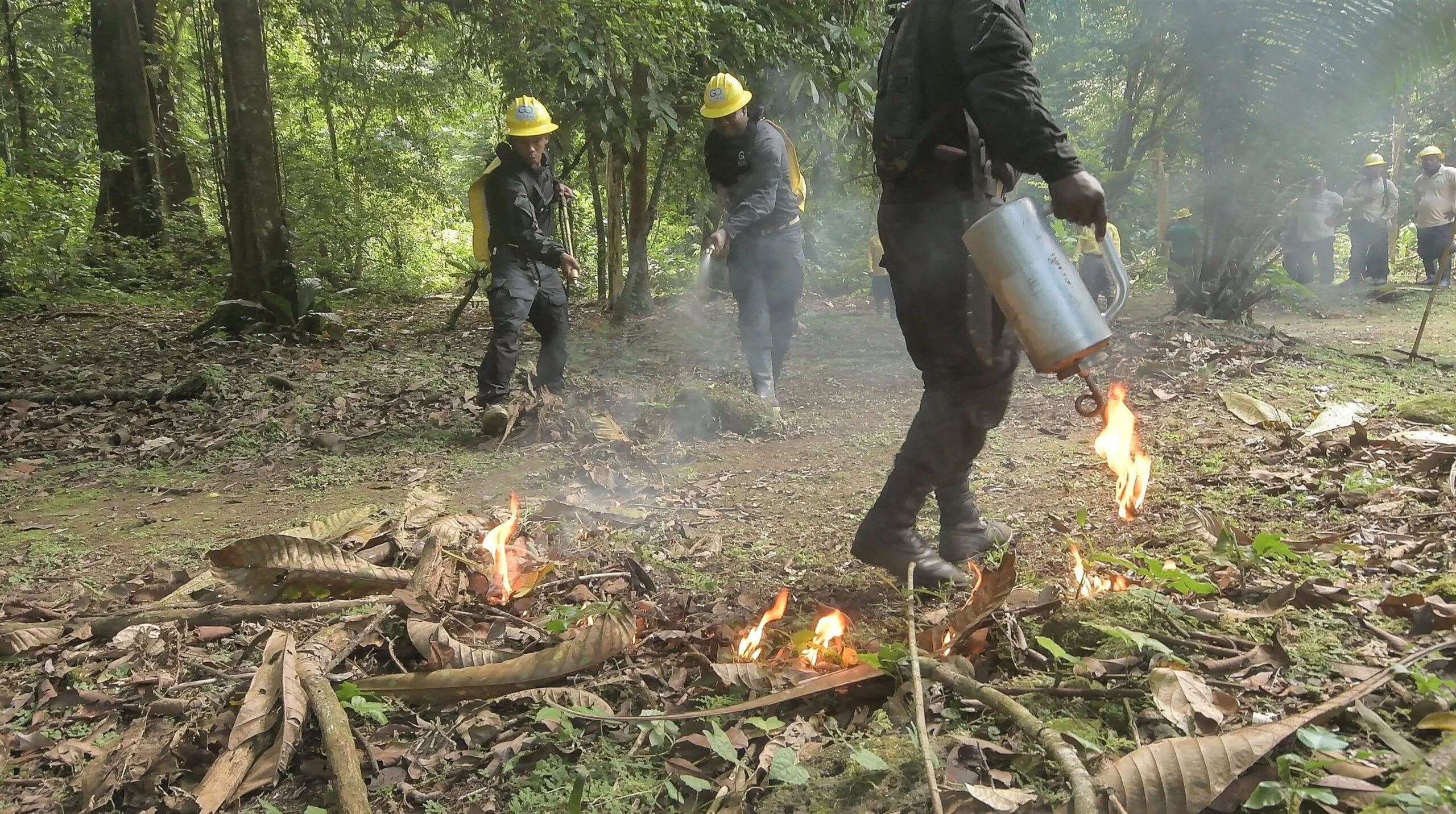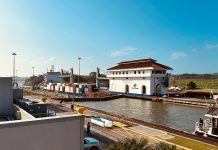Por Elena Ramírez, Periodista Ambiental Panamá, 21 de octubre de 2025
En lo que va de 2025, Panamá ha sido testigo de una alarmante oleada de incendios forestales que han consumido miles de hectáreas de sus preciados bosques tropicales, poniendo en jaque la rica biodiversidad que caracteriza al istmo. Según datos del Ministerio de Ambiente (MiAMBIENTE), solo en el primer trimestre del año se atendieron 58 incendios de masa vegetal, afectando un total de 1,363.09 hectáreas. Esta cifra, aunque representa una reducción en comparación con años anteriores gracias a esfuerzos interinstitucionales, no oculta la gravedad del problema: más de 2,000 incendios de herbazales han sido reportados hasta agosto, con un impacto económico y ambiental estimado en millones. Estos eventos no solo queman vegetación; destruyen ecosistemas enteros, amenazando la supervivencia de especies endémicas y alterando el equilibrio natural que sostiene la vida en el país.
Panamá, con su posición geográfica privilegiada entre dos océanos y su diversidad de biomas —desde selvas húmedas hasta manglares y bosques nubosos—, alberga una de las biodiversidades más altas del mundo. Sin embargo, los incendios forestales, exacerbados por el cambio climático y actividades humanas, están erosionando esta herencia natural a un ritmo alarmante. Este artículo explora en profundidad cómo estos fuegos devoran la naturaleza panameña, basándose en datos recientes y análisis científicos, y destaca la urgencia de acciones preventivas para mitigar el daño irreversible.
Las Causas Detrás de las Llamas: Un Cóctel de Factores Humanos y Climáticos
Los incendios forestales en Panamá no son fenómenos aislados; son el resultado de una combinación letal de factores antropogénicos y ambientales. El cambio climático juega un rol pivotal, intensificando las sequías y elevando las temperaturas, lo que seca la vegetación y facilita la propagación del fuego. Según un informe de los bomberos panameños, el impacto del cambio climático en los incendios de masa vegetal genera problemas como la contaminación atmosférica y el desecamiento de los suelos. En 2025, la temporada seca se ha prolongado, creando condiciones ideales para que chispas accidentales o intencionales se conviertan en catástrofes.
Actividades humanas agravan el problema. La quema agrícola tradicional, conocida como «tala y quema», es una práctica común en regiones rurales para preparar terrenos para cultivos o pastizales. En provincias como Darién y Los Santos, donde la agricultura y la ganadería son pilares económicos, estos métodos a menudo escapan de control. Además, la negligencia, como el descarte de cigarrillos o fogatas mal apagadas, contribuye significativamente. Un análisis reciente indica que el 84.4% de los incendios en 2025 involucran gramíneas o rastrojos, con alto riesgo de propagación a bosques cercanos. El urbanismo expansivo y la deforestación previa también debilitan los ecosistemas, haciendo que los bosques sean más vulnerables.
El Programa de Prevención y Manejo de Fuego de MiAMBIENTE ha lanzado campañas para educar sobre estos riesgos, pero los expertos advierten que sin regulaciones más estrictas, los incendios continuarán escalando. En un estudio publicado en la Revista Epicentro, se resalta cómo el cambio climático amplifica estos factores, reduciendo la capacidad de recuperación de los ecosistemas.
Destrucción Inmediata: El Fuego que Consume Hábitats y Vida Silvestre
Cuando un incendio forestal irrumpe en los bosques de Panamá, la destrucción es inmediata y devastadora. Las llamas consumen la capa vegetal superior, matando árboles centenarios y arbustos que forman la base de la cadena alimentaria. En regiones como el Parque Nacional Darién, hogar del jaguar (Panthera onca) y el águila arpía (Harpia harpyja), los fuegos destruyen hábitats críticos, forzando a las especies a migrar o perecer. Un informe detalla que los incendios afectan directamente la biodiversidad, amenazando especies endémicas en parques nacionales como Coiba y La Amistad.
La pérdida de biodiversidad es alarmante. Panamá alberga más de 10,000 especies de plantas, 1,000 de aves y cientos de mamíferos, anfibios y reptiles. Los incendios no solo matan individuos directamente —por asfixia o quemaduras— sino que fragmentan poblaciones, aumentando el riesgo de extinción local. Por ejemplo, en el Bosque Protector Palo Seco, hábitat del mono araña y el tapir, los fuegos han reducido la cobertura arbórea, exponiendo a estas especies a depredadores y escasez de alimento. Estudios globales indican que en bosques tropicales, la mayor pérdida de biomasa ocurre en países en desarrollo como Panamá.
Además, los manglares y humedales, vitales para la filtración de agua y protección costera, sufren graves daños. En Bocas del Toro, conocidos por su alta diversidad en herpetología, los incendios alteran estos ecosistemas sensibles, afectando corales, tortugas marinas y delfines. Datos históricos muestran que entre 2009 y 2021, Darién fue la provincia más impactada con 92,040.91 hectáreas afectadas, seguido por Panamá y Bocas del Toro. En 2016, el pico alcanzó 80,295.46 hectáreas, un recordatorio de la magnitud posible.
Efectos a Largo Plazo: Erosión del Suelo, Alteración del Agua y Emisiones de Carbono
Más allá del daño visible, los incendios dejan cicatrices duraderas en la naturaleza. La quema de la vegetación expone el suelo a la erosión, lavando nutrientes esenciales y aumentando la sedimentación en ríos y lagos. En Panamá, donde los bosques regulan el ciclo hidrológico, esto afecta la calidad del agua potable y la salud de los ecosistemas acuáticos. La contaminación por cenizas y humo libera toxinas que impactan la vida marina en el Golfo de Chiriquí, afectando ballenas jorobadas y peces.
El cambio en la composición del suelo fomenta la invasión de especies exóticas, alterando el equilibrio ecológico. Bosques nubosos, como los de la Reserva de la Biosfera La Amistad, pierden su capacidad para capturar humedad, exacerbando sequías futuras. Un estudio sobre Latinoamérica advierte que si un segundo incendio ocurre en cinco años, las consecuencias son devastadoras para el bosque y su biodiversidad.
Otro impacto crítico es la liberación de dióxido de carbono (CO2), contribuyendo al calentamiento global. Los bosques panameños actúan como sumideros de carbono, pero los incendios los convierten en fuentes emisoras. En 2024, los trópicos perdieron 6.7 millones de hectáreas de selva primaria, un área comparable al tamaño de Panamá entero. Esto acelera el ciclo vicioso del cambio climático, haciendo que los incendios sean más frecuentes e intensos.
Comunidades indígenas, como los Emberá y Ngäbe-Buglé, sufren directamente, perdiendo recursos forestales para alimento, medicina y vivienda. El impacto económico se estima en millones, con pérdidas en turismo ecológico y agricultura sostenible.
Casos Emblemáticos: Darién y Los Santos Bajo Amenaza
El Parque Nacional Darién, Patrimonio Mundial de la UNESCO, es un hotspot de destrucción. En 2025, incendios han afectado áreas protegidas, amenazando corredores biológicos para especies migratorias. Datos muestran un aumento en la frecuencia, con índices endémicos elevados que indican epidemias de fuego.
En la provincia de Los Santos, los incendios recurrentes devastan la biodiversidad local, quemando sabanas y bosques secos. Un documento resalta cómo estos eventos contribuyen a la deforestación y contaminación. Residentes reportan pérdidas de fauna, como aves y reptiles, y un aumento en la desertificación.
Esfuerzos de Prevención y Resiliencia: Hacia un Futuro Sostenible
Ante esta crisis, Panamá ha intensificado sus estrategias. La labor interinstitucional, involucrando a bomberos, MiAMBIENTE y comunidades, ha reducido incendios en el primer trimestre de 2025. Campañas de prevención, lanzadas en diciembre de 2024, promueven prácticas alternativas a la quema y monitoreo satelital.
Expertos recomiendan restauración de hábitats, como reforestación con especies resistentes al fuego, y educación comunitaria. Organizaciones internacionales, como UNICEF, destacan la vulnerabilidad de la infraestructura a impactos climáticos. El Nivel de Referencia Forestal 2020-2025 busca liderar procesos de conservación.
Conclusión: Un Llamado a la Acción Inmediata
Los incendios forestales en Panamá no son solo un desastre natural; son una alarma sobre la fragilidad de nuestra naturaleza. Con más de 60,000 hectáreas afectadas entre 2020 y 2024, y tendencias al alza en 2025, el país enfrenta una encrucijada. Proteger los bosques requiere compromiso colectivo: desde políticas estrictas hasta participación ciudadana. Si no actuamos ahora, la destrucción podría ser irreversible, robándonos un legado de biodiversidad invaluable. Panamá, puente de vida, no puede permitirse arder en silencio












